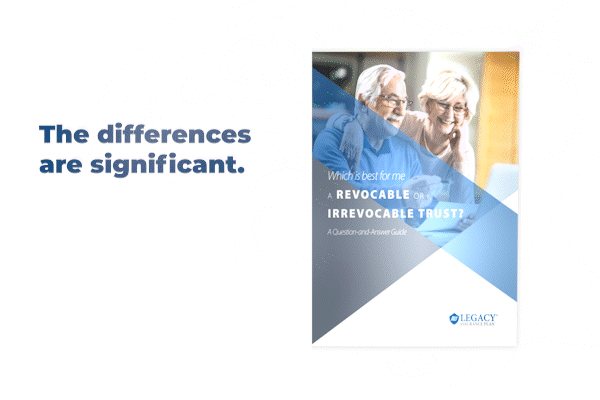One objective of an estate plan is to protect your assets from an array of liabilities and preserve them for generations to come. An irrevocable trust can help you accomplish that important goal.
The Muth family farm in southern New Jersey has been in operation since 1956. Over the years, it has produced vegetables, raised beef herds and grown hay to feed livestock.
Since the farm's founding, residential developments have appeared all around the family's historic acreage. Neighboring farms have vanished; single-family homes now surround the property. The profitable fields have become an island of green amid an ocean of rooftops.
Bob Muth took over management of the family farm from his father in the 1980s, and Bob hopes his own son, representing the third generation of the family, eventually takes over. Bob's six siblings all pursued non-farming vocations, and Bob's parents were faced with competing interests of their children as they developed an estate plan.
The opinions of the Muth siblings varied on the eventual fate of the farmland - either selling it or keeping it in the family upon the death of their parents. But the goal of Bob's parents was that successive generations would continue to benefit from the valuable land, perpetuate the family's tradition of farming and make sure it doesn't become a paved-over subdivision.
“For everyone, it was a time of sorting out values, about respecting parental wishes and about considering what everyone stood to gain or lose,” says a study on the family's succession planning by New Jersey's State Agriculture Development Committee (SADC). “A challenge for everyone was also weighing the philosophical, emotional and monetary worth of keeping the farm in operation as an investment versus selling it and gaining some personal wealth at the expense of Bob's livelihood.”

Muth's parents followed the advice of an estate planning professional who recommended they protect the farmland by transferring its ownership to an irrevocable living trust and naming Bob as trustee to carry out the trust's instructions.
Part of the parents' goal was to shield the land from potential creditors, lawsuits, divorce settlements and other obligations that could follow their children. Leaving ownership of the farm outright to the children could expose the real estate to their individual liabilities and could force land to be sold. Leaving the property vulnerable to claims could defeat the goal of keeping the land in the family for future generations.
Once the seven siblings realized the value of the farmland would continue to appreciate, they agreed an irrevocable living trust was the best option for their parents to pursue.
“Our assets are locked in place,” says Bob, who now rents the land from its owner - the irrevocable trust - and the farm's income is divided among all the siblings, who are the beneficiaries of the trust. The trust remains owner of the land as long as it's operated and preserved as a farm by a family member. Should Bob's son or another member of the third generation decide not to operate the farm, the trust's instructions allow the beneficiaries to sell the land to a conservancy to spare it from development.
In the case of the Muth family, an irrevocable trust played a limited but important role - dealing with one specific asset - as part of an overall estate plan.
How do revocable and irrevocable trusts vary?
A trust is generally defined as an agreement allowing property to be held by one party for the benefit of another.

A chief goal of a revocable living trust is to protect assets from probate. Revocable trusts also are flexible, enabling the trust's creator, or grantor, to manage and utilize trust assets during the grantor's lifetime.
In contrast, the primary purpose of an irrevocable trust is as an asset protection tool that keeps property out of reach from a variety of threats. The downside is that the assets you transfer into an irrevocable trust are out of your reach. You no longer legally own and manage the assets.
As the name implies, an irrevocable trust is a rigid arrangement that can't be readily terminated, amended or altered once signed by the grantor. Assets are owned by the trust, managed by the trustee (according to the trust's instructions) and eventually distributed to beneficiaries.
The grantor of an irrevocable trust - unlike a revocable trust - cannot serve as trustee or remove assets funded into the trust. However, both revocable and irrevocable trusts avoid probate if properly funded.
As an asset protection device, irrevocable trusts may be used to shield assets from a grantor's personal creditors, but timing is important. You can't wait until you've been sued to move assets into an irrevocable trust. Such an action would be considered a fraudulent transfer, not an innocent strategy to protect property.
Liquidity is another key difference. Revocable living trusts often include assets that may be needed by the grantor to fund current or future obligations. Planners warn that you should never place assets that may be needed for daily living expenses into an irrevocable trust.

Assets titled into a revocable trust still are considered the grantor's personal assets. In that context, the accessibility and liquidity of funds in a revocable trust can be a disadvantage regarding debts and divorce. The idea with an irrevocable trust is that you can't lose - or use - what you don't have.
As an estate planning tool, irrevocable trusts are used less frequently than revocable trusts. Besides asset protection, they typically are utilized for Medicaid eligibility purposes, special needs planning and estate tax avoidance. Also, an irrevocable trust is a separate taxpayer from the grantor, and income generated by an irrevocable trust is usually taxed at a higher rate than personal income.
Despite their limitations and legal formalities, irrevocable trusts can ensure your estate's assets won't be squandered by a spendthrift, consumed by creditors or decimated by long-term care expenses - and that there will be something left for the beneficiaries to inherit.
Strategies involving asset protection, such as preserving the family farm, are complex. The use of an irrevocable trust as part of a successful comprehensive estate plan requires guidance from legal and financial professionals.



